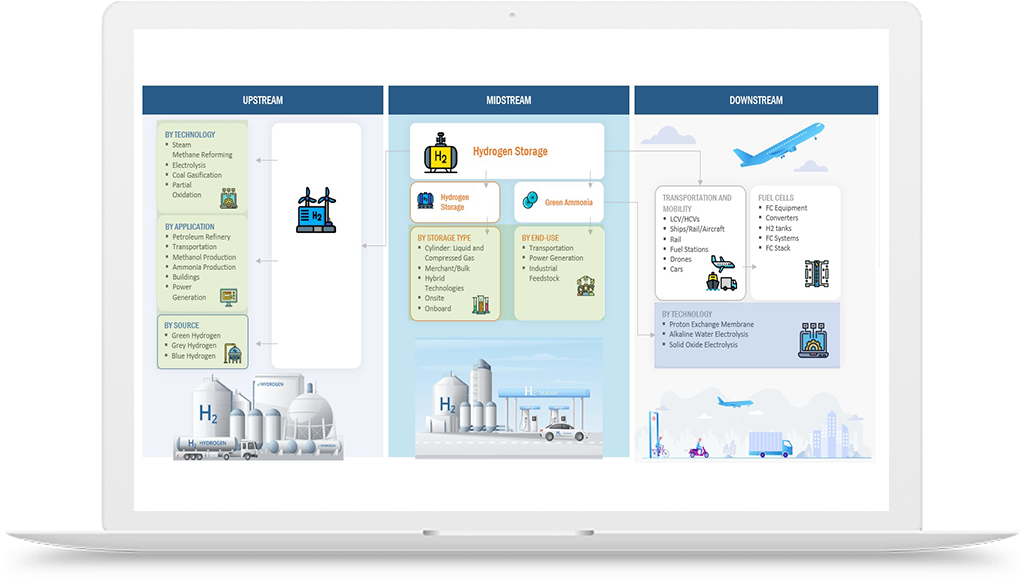Key Challenges in Hydrogen Economy
Examining the key challenges in hydrogen economy reveals intricate barriers like infrastructure development, cost competitiveness, and technological advancements that need to be surmounted in order to fully utilize hydrogen as a clean energy source.
Navigating issues pertaining to hydrogen production techniques, storage technologies, and establishing an all-encompassing supply chain that guarantees widespread accessibility and utilization are crucial to addressing the key challenges in hydrogen economy.
As the world moves toward a hydrogen economy, researchers, policymakers, and business executives are working together to identify potential solutions for the major problems, promote creativity, and develop a roadmap for the effective assimilation of hydrogen into the world's energy system.
Although hydrogen has great potential as a flexible and clean energy source, a number of important issues must be resolved before the hydrogen economy can fully take off. Among these difficulties are:
Cost: For widespread adoption, a strong hydrogen infrastructure must be established. This covers the construction of infrastructure for the production, storage, and transportation of hydrogen as well as refueling stations. This infrastructure needs to be built, and it will cost a lot of money and require cooperation from many parties. One major obstacle to the widespread use of hydrogen fuel cell vehicles is the scarcity of hydrogen refueling stations.
Infrastructure: The establishment of a robust hydrogen infrastructure is crucial for widespread adoption. This includes the development of hydrogen production facilities, storage systems, transportation networks, and refueling stations. Building this infrastructure requires substantial investment and coordination among various stakeholders. The limited availability of hydrogen refueling stations is a significant hurdle for the widespread adoption of hydrogen fuel cell vehicles.
Storage and Distribution: Because of its low volumetric energy density, hydrogen is difficult to store and move. The storage and distribution of hydrogen necessitates the development of safe and effective techniques, which call for large storage volumes or high-pressure tanks. Technical and logistical difficulties also arise in expanding hydrogen pipeline networks and converting natural gas infrastructure that is already in place for use with hydrogen.
Technological Advancements: : To increase effectiveness, lower costs, and improve performance, developments in hydrogen production, storage, and utilization technologies are required. High-capacity hydrogen storage materials, sophisticated fuel cells, and more effective electrolysis techniques are the subjects of ongoing research and development. Improvements in these areas are necessary to support hydrogen's viability and competitiveness as an energy carrier.
Safety: Because hydrogen is extremely flammable, it must be handled and stored with caution. Ensuring safe production, transportation, and utilization of hydrogen requires the establishment of safety measures and protocols along the entire value chain. Gaining the public's acceptance and trust requires creating and enforcing strict safety standards and laws.
Policy and Regulations: To encourage the expansion of the hydrogen economy, clear and encouraging policies and regulations are crucial. For investment in hydrogen infrastructure and technology development, governments must offer long-term incentives, financing, and regulatory frameworks. The worldwide adoption of hydrogen technologies can be aided by international cooperation in the establishment of uniform standards and laws.
Public Awareness and Acceptance: It is essential to increase public acceptance and awareness of hydrogen as a practical energy source. Dispelling myths and disbeliefs about hydrogen requires educating the public about its advantages, safety precautions, and environmental benefits.
A multifaceted strategy including cooperation between industries, research institutions, and governments is needed to address these issues. To successfully overcome these obstacles and make the shift to a hydrogen economy, infrastructure investments, policy support, ongoing research and development, and international collaboration are essential.
Details that can help investors make informed decisions regarding the challenges facing the transition to a hydrogen economy:
Cost:
- It is anticipated that continuing technological developments and economies of scale will lower the cost of producing hydrogen, increasing its competitiveness with traditional fuels.
- Advances in electrolysis technology, such as the use of more effective catalysts and membrane materials, should be closely watched by investors because they have the potential to drastically lower production costs.
- When renewable electricity is used for electrolysis, the cost of hydrogen is reduced overall, which is a benefit for the production of hydrogen due to the decreasing cost of renewable energy sources like solar and wind.
Infrastructure:
- Investors ought to take into account the possible expansion of hydrogen infrastructure, especially in areas where governments are aggressively pushing the construction of pipeline networks and hydrogen refueling stations.
- Evaluating the state of public-private partnerships and government programs targeted at building out hydrogen infrastructure can shed light on the potential for future growth in investments related to hydrogen.
- Industry participants, governments, and infrastructure developers working together can hasten the implementation of hydrogen infrastructure and open up investment opportunities in building, equipment manufacturing, and system integration.
Storage and Distribution:
- Investors should keep an eye on advancements in hydrogen storage technologies. Research efforts focused on high-capacity storage materials, such as solid-state hydrogen storage and metal hydrides, could enhance the efficiency and viability of hydrogen storage.
- Monitoring the development of hydrogen transportation and distribution networks, including the retrofitting of existing infrastructure, can provide insights into investment opportunities in infrastructure expansion, equipment manufacturing, and logistics services.
Technological Advancements:
- Investors need to evaluate the development and promise of new technologies for producing, storing, and using hydrogen. Technological developments in fuel cells, electrolysers, and hydrogen fueling systems are areas worth taking into account.
- Investing in startups and research institutes that are creating ground-breaking technologies, like affordable electrolysis and effective fuel cell designs, may offer prospects for long-term growth.
Policy and Regulations:
- Investors ought to study the laws and rules pertaining to hydrogen. Encouraging policies can boost market demand and foster an atmosphere that is conducive to investment, such as mandates, tax breaks, and subsidies.
- Keep yourself updated about global partnerships and accords that seek to standardize hydrogen technology standards and laws. This can assist in locating areas that have the potential for cross-border investments and advantageous regulatory frameworks.
Public Awareness and Acceptance:
- Think about keeping an eye on public perceptions of hydrogen. Growing public acceptance and support can spur market demand and open doors for investments in hydrogen-related projects.
- Investment choices can be influenced by gauging public opinion of clean energy options and comprehending the possible contribution of hydrogen to decarbonization initiatives.
Investors should evaluate market conditions, carry out extensive due diligence, and keep up with the most recent advancements in public acceptance, policy, and technology. In order to gain valuable insights for making well-informed investment decisions in the hydrogen sector, it can be beneficial to interact with industry experts, attend conferences and trade shows, and keep an eye on pertinent publications.
















